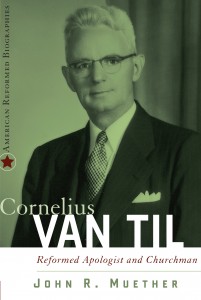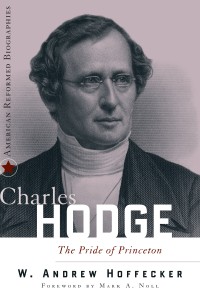The American Reformed Biographies, coedited by D. G. Hart and Sean Michael Lucas, seeks to nurture the general interest in biographies as a way of learning about and from the past. The titles in this series feature American Reformed leaders who were important representatives or interpreters of Reformed Christianity in the United States and who continue to be influential through writings and arguments still pertinent to the self-understanding of Presbyterian and Reformed theologians, pastors, and church members. This series is designed to make available the best kind of historical writing – one that yields both knowledge and wisdom.
- Robert Lewis Dabney: A Southern Presbyterian Life by Sean Michael Lucas Release Date: 4/8/2005 | Page Count: 296 | Price: $24.99 | Hardcover
Robert Lewis Dabney (1820–1898) was a Presbyterian theologian and educator who served on the faculties of Union Theological Seminary in Virginia, the University of Texas, and Austin Theological Seminary. Those who knew him—both friends and foes—viewed him as larger than life, “closer to a biblical prophet than a theological professor,” writes Sean Lucas. As this biography explains, “Dabney was far more complex than either historians or admirers concede.” He was “in many ways a representative man, one who embodied the passions and contradictions of nineteenth-century Southerners.” As such he “provides a window into the postbellum Southern Presbyterian mind” and a reminder of how important nineteenth-century theology is for contemporary issues and debates.
served on the faculties of Union Theological Seminary in Virginia, the University of Texas, and Austin Theological Seminary. Those who knew him—both friends and foes—viewed him as larger than life, “closer to a biblical prophet than a theological professor,” writes Sean Lucas. As this biography explains, “Dabney was far more complex than either historians or admirers concede.” He was “in many ways a representative man, one who embodied the passions and contradictions of nineteenth-century Southerners.” As such he “provides a window into the postbellum Southern Presbyterian mind” and a reminder of how important nineteenth-century theology is for contemporary issues and debates.
- John Williamson Nevin: High Church Calvinist by D. G. Hart Release Date: 8/26/2005 | Page Count: 272 | Price: $22.99 | Hardcover
 This biography, written by a provocative, prolific historian, gives readers insights into Nevin’s critique of the revivalist tradition and shows how it applies today. Hart recovers a nearly forgotten nineteenth-century theologian and demonstrates his ongoing relevance. This book is extensively documented, and includes a substantial bibliographical essay and an index. Nevin (1803–1886) taught at Mercersburg Seminary when he wrote The Anxious Bench (1843) and The Mystical Presence (1846), volumes dealing with revivalism and the Lord’s Supper, respectively. The last ten years have seen a revival of interest in this theologian, who was a graduate of Princeton Theological Seminary and who substituted for Hodge during his two-year study-leave in Europe.
This biography, written by a provocative, prolific historian, gives readers insights into Nevin’s critique of the revivalist tradition and shows how it applies today. Hart recovers a nearly forgotten nineteenth-century theologian and demonstrates his ongoing relevance. This book is extensively documented, and includes a substantial bibliographical essay and an index. Nevin (1803–1886) taught at Mercersburg Seminary when he wrote The Anxious Bench (1843) and The Mystical Presence (1846), volumes dealing with revivalism and the Lord’s Supper, respectively. The last ten years have seen a revival of interest in this theologian, who was a graduate of Princeton Theological Seminary and who substituted for Hodge during his two-year study-leave in Europe.
- Cornelius Van Til: Reformed Apologist and Churchman by John R. Muether Release Date: 3/15/2008 | Page Count: 288 | Price: $24.99 | Hardcover

This work contributes to an understanding of Van Til and his apologetic insights by placing him within the context of twentieth century developments in North American Reformed theology, including the formation of Westminster Seminary and the Orthodox Presbyterian Church, the rise of neo-evangelicalism, and the American reception of Karl Barth.
- James Petigru Boyce: A Southern Baptist Statesman by Thomas J. Nettles Release Date: 6/1/2009 | Page Count: 616 | Price: $29.99 | Hardcover
 Boyce founded the Southern Baptist Theological Seminary and was a prominent Southern Baptist figure. Nettles focuses on Boyce’s struggle to establish the Seminary and the theological controversies of his times.
Boyce founded the Southern Baptist Theological Seminary and was a prominent Southern Baptist figure. Nettles focuses on Boyce’s struggle to establish the Seminary and the theological controversies of his times.
- Charles Hodge: The Pride of Princeton by W. Andrew Hoffecker Release Date: 11/1/2011 | Page Count: 464 | Price: $19.99 | Paperback

Charles Hodge, perhaps the most significant nineteenth-century American theologian, drove the growth of theological education and Presbyterianism’s lasting influence in public life. Learn the life, theology, and influence of this central Reformed figure.
Upcoming Titles:
John Witherspoon: Winter 2014
Geerhardus Vos: Spring 2015

Ryan J. Ross
-I enjoyed a number of the biographies in this series. Do you plan on releasing a new biography soon? It’s been a few years.
Mark
-Great series! Disappointing that you did not stick with doing all of them in hardback. I assume the next two upcoming volumes will be paper just like Hodge volume was. Also, are there any other planned volumes in the series?
Cherith
-Yes, the rest of the series will continue in paperback. We switched to paperback so that they would be more affordable.